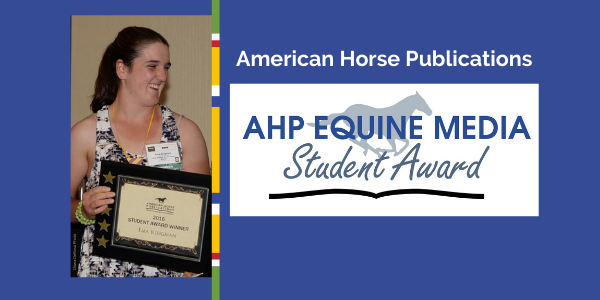Foal Owners Beware: The Danger of Ascarids
The United States Pony Clubs, Inc. has partnered with Merck Animal Health to bring you a series of blogs based on current horse health. This first post was written by Dr. Bryant Craig, DVM, Merck Animal Health Equine Technical Services Veterinarian.
While all intestinal parasites are concerning, one of the most lethal threatens horses during their first 18 months of life.
The Suspect
Ascarids, also known as roundworms, are migrating parasites that travel through the bloodstream to the horse’s liver and lungs during their juvenile stage before returning to the small intestine to develop into a mature parasite. Because of this migration, clinical signs of an ascarid infection can vary from respiratory disease to impaction colic, both of which can threaten your foal’s health and potentially his life.
“Ascarid infections are extremely prevalent in foals and are virtually ubiquitous at breeding facilities where new foals are raised annually,” says Craig R. Reinemeyer, D.V.M., Ph.D., president of East Tennessee Clinical Research, Inc., an independent business that conducts research for animal health companies.
To Complicate Matters
Not only are ascarids a serious concern, but they also have developed wide-spread resistance to ivermectin and moxidectin(1), two deworming compounds commonly used to control them.
In a peer-reviewed study led by Dr. Reinemeyer, foals with confirmed ivermectin-resistant ascarid infections were split into two groups and either treated with a larvicidal dose of fenbendazole (10 mg/kg daily for 5 days) or with an oral ivermectin dewormer at the labeled dose. Starting at 72 days post-infection, fecal samples were collected regularly and examined for ascarid eggs. The group treated with a larvicidal dose of fenbendazole had an average egg per gram fecal count of 1.35. The group treated with ivermectin had an average egg per gram count of 281.03, confirming the ascarids were resistant to ivermectin at the labeled dose(2).
“Five consecutive days of treatment with fenbendazole at 10 mg/kg decreased the number of adult ascarids by 96.3 percent and associated egg counts by 99.5 percent,” Dr. Reinemeyer says. “Given the high prevalence of macrocyclic lactone resistance in ascarid populations, a five-day regimen of fenbendazole is the only anthelmintic consistently effective against immature ascarid infections.”
Sounds Good, but is it Safe?
Not all dewormers you find on the shelf at your tack and feed store are safe for use in foals, but fenbendazole is one option that is extremely safe at all of its labeled doses.
“Overall, benzimidazole anthelmintics (which include fenbendazole) might be the best therapeutic choice for ascarid infections in all foals,” Dr. Reinemeyer says. “The benzimidazole drug class affects worm metabolism and kills them slowly. The other anthelmintic classes approved for use in foals (pyrantel salts and macrocyclic lactones) affect the nervous system of worms, which kills them rather quickly. The latter situation seems to result in small intestinal impactions with dead ascarids more frequently than after treatment with the benzimidazole class.”
What About My Other Horses?
Due to widespread ascarid resistance to ivermectin and moxidectin, ascarids can also threaten horses older than 18 months that were not effectively dewormed as foals and have harbored an ascarid infection into their adulthood(3). In addition to foals, fenbendazole should also be considered as part of a veterinarian-guided deworming regimen for adult horses.
A single dose of fenbendazole (5 mg/kg for adult horses and 10 mg/kg for young horses less than 18 months of age) is labeled and recommended for the control of large and small strongyles, pinworms and ascarids. Additionally, a larvicidal dose of fenbendazole is the only FDA-approved treatment labeled for all stages of encysted small strongyles(4). Fenbendazole is safe and recommended as part of a strategic deworming regimen for:
• Foals
• Weanlings
• Yearlings
• Broodmares
• Performance horses
• Debilitated or thin horses
• Horses with recurrent colic or chronic diarrhea
• Horses with chronic weight loss
• Senior horses ]
Take-Home Message
Ascarid infections are not something owners should take lightly. Work with your veterinarian to protect your foals from this potentially fatal parasite and to create a deworming regimen based on fecal egg count tests for every horse in your barn.
Do not use in horses intended for human consumption.
Consult your veterinarian for assistance in the diagnosis, treatment and control of parasitism.

References:
1Reinemeyer CR. Diagnosis and control of anthelmintic-resistant Parascaris equorum. Parasites & Vectors 2009, 2(Suppl 2):S8.
2Reinemeyer CR, Vaala, WE. Larvicidal efficacy of fenbendazole against a macrocyclic lactone-resistant isolate of Parascaris equorum in foals. 2010 AAEP Proceedings.
3AAEP Parasite Control Guidelines. Revised 2013.
4Panacur® (fenbendazole) Power Pac Equine Dewormer product label.



